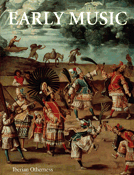
EARLY MUSIC
Scope & Guideline
Bridging Tradition and Innovation in Music
Introduction
Aims and Scopes
- Historical Musicology:
Focuses on the historical development of music from the medieval to the early modern period, analyzing composers, works, and their societal impact. - Performance Practice:
Investigates the techniques and methods used in the performance of early music, emphasizing historical authenticity and the interpretation of period instruments. - Cross-Cultural Studies:
Explores the interactions between different musical traditions and cultures, examining how early music has influenced and been influenced by various global contexts. - Music and Society:
Studies the relationship between music and social, political, and religious structures, including how music functions in rituals, celebrations, and daily life. - Manuscript Studies and Archival Research:
Engages with primary sources such as manuscripts and archives to uncover new insights into the creation and transmission of early music.
Trending and Emerging
- Interdisciplinary Approaches:
Research that intersects musicology with other fields such as history, literature, and visual arts is on the rise, reflecting a broader understanding of music's cultural significance. - Digital Humanities in Musicology:
The integration of digital tools and methodologies is becoming increasingly prominent, with studies utilizing technology to analyze, preserve, and disseminate early music. - Focus on Gender and Identity:
There is a growing emphasis on gender studies and the role of identity in early music, exploring how gender dynamics have shaped musical practices and representations. - Revival of Historical Instruments:
An increasing interest in the performance and study of historical instruments is evident, with research focusing on their construction, sound characteristics, and role in early music ensembles. - Global Perspectives on Early Music:
The journal is expanding its focus to include global musical traditions and their interactions with European music, highlighting a more inclusive view of early music's history.
Declining or Waning
- Traditional Musicology:
There seems to be a decline in strictly traditional musicological approaches that focus solely on analysis of scores and music theory without considering broader cultural contexts. - Exclusively Western Canon:
The focus on the Western canon of early music appears to be decreasing as the journal embraces a more global perspective, integrating non-Western musical traditions. - Narrow Biographical Studies:
Research centered on individual composers' biographies is becoming less frequent, with a shift towards more thematic and contextual explorations that encompass wider socio-cultural movements. - Static Performance Practices:
There is less emphasis on rigid historical performance practices. Instead, the journal is increasingly examining the fluidity and adaptability of performance in contemporary contexts. - Isolated Genre Studies:
Studies focusing on isolated genres or specific types of early music are waning, as interdisciplinary approaches that connect various genres and forms are becoming more favored.
Similar Journals
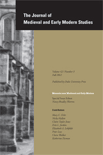
JOURNAL OF MEDIEVAL AND EARLY MODERN STUDIES
Advancing Scholarship in Arts and HumanitiesThe JOURNAL OF MEDIEVAL AND EARLY MODERN STUDIES, published by DUKE UNIVERSITY PRESS, is a distinguished platform dedicated to exploring the intricacies of medieval and early modern cultures through an interdisciplinary lens. With an ISSN of 1082-9636, this journal has been pivotal in advancing scholarship from 2002 to 2024, providing researchers, professionals, and students with insightful contributions that enhance understanding within the fields of Arts and Humanities and Cultural Studies. With its current standing as Q3 in both category quartiles for 2023 and respectable ranking in Scopus, this publication attracts a diverse readership and stimulates critical conversations about historical narratives and cultural phenomena. Although not an open-access journal, its rich content serves as an invaluable resource for those seeking to delve deeper into the complexities of past societies. The journal’s commitment to excellence in scholarship underscores its vital role in the academic community.
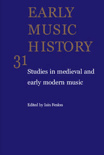
EARLY MUSIC HISTORY
Illuminating the Soundscapes of HistoryEARLY MUSIC HISTORY is an esteemed academic journal published by Cambridge University Press, specializing in the rich and diverse field of early music, providing a vital platform for research and discourse since its inception. With an ISSN of 0261-1279 and an E-ISSN of 1474-0559, the journal operates from its headquarters in Cambridge, United Kingdom. Known for its scholarly rigor, EARLY MUSIC HISTORY is ranked within the Q2 category in Music, illustrating its significant contribution to the field. The journal covers a broad time frame, examining musical developments from the medieval to the early modern period, and features articles that seek to illuminate historical contexts and contemporary implications of early music practices. Despite lacking the Open Access option, it remains a valued resource for researchers and professionals seeking to advance their understanding of this dynamic area of study. The journal not only fosters a deeper appreciation of early music history but also positions itself as a pivotal contributor to ongoing academic dialogue, making it essential reading for scholars in the arts and humanities.

ACTA MUSICOLOGICA
Pioneering Conversations in the World of MusicologyACTA MUSICOLOGICA, published by the International Musicological Society, stands as a pivotal journal within the field of Musicology, garnering attention from scholars and practitioners alike. With its ISSN 0001-6241, the journal serves as a vital platform for innovative research and discourse from 2002 to 2013 and again from 2016 to 2024, achieving a Q2 ranking in the 2023 Music category. Reflecting a commitment to excellence, it ranks #105 out of 180 in Arts and Humanities Music according to Scopus, placing it at the 41st percentile among its peers. Although not open access, ACTA MUSICOLOGICA ensures the dissemination of significant musical research, fostering scholarly exchange and exploration. This esteemed publication is essential for researchers, professionals, and students looking to deepen their understanding of musicology and contribute to ongoing academic conversations.

Musicologica Brunensia
Cultivating a Global Community of Music ScholarsMusicologica Brunensia, an esteemed journal published by Masaryk University, Faculty of Arts, serves as a significant platform for the dissemination of knowledge in the field of musicology. Based in the Czech Republic, this Open Access journal has been facilitating scholarly communication since 2009, allowing unrestricted access to its rich array of research articles. With an ISSN of 1212-0391 and an E-ISSN of 2336-436X, Musicologica Brunensia proudly holds a Q3 ranking in the Music category as of 2023, reflecting its dedication to advancing research in the arts and humanities, particularly music. The journal accepts contributions spanning diverse topics within music studies, fostering interdisciplinary dialogue among researchers, professionals, and students alike. Located at Arne Novaka 1, Brno, 60200, Czech Republic, Musicologica Brunensia is poised to continue its journey of promoting innovative scholarship in musicology until 2024 and beyond, making it a valuable resource for anyone passionate about the field.
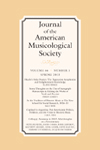
JOURNAL OF THE AMERICAN MUSICOLOGICAL SOCIETY
Fostering scholarly dialogue in musicology.JOURNAL OF THE AMERICAN MUSICOLOGICAL SOCIETY, published by University of California Press, is a prestigious peer-reviewed journal dedicated to advancing the field of musicology. With an ISSN of 0003-0139 and E-ISSN 1547-3848, this journal has been a cornerstone of scholarly communication since its inception in 1970 and continues to be relevant through 2024. Its esteemed standing is reflected in its Q2 ranking in the Music category and a respectable 71/180 ranking in the Arts and Humanities discipline, placing it in the 60th percentile among its peers. The journal provides an essential platform for researchers, professionals, and students to explore diverse topics in musicology, ranging from historical studies to contemporary analyses. While it does not currently offer Open Access options, its rigorous editorial standards ensure the publication of high-quality research that contributes significantly to the academic dialogue in music studies. With its address based in the United States at 155 Grand Ave, Suite 400, Oakland, CA 94612-3758, the journal remains a vital resource for those seeking to deepen their understanding of the complexities of music and its societal impacts.

FONTES ARTIS MUSICAE
Exploring the intersections of music, scholarship, and creativity.FONTES ARTIS MUSICAE, with ISSN 0015-6191 and E-ISSN 2471-156X, is a distinguished journal published by A-R EDITIONS, specializing in the fields of Music and Library and Information Sciences. Established in the United States, this journal serves as a vital resource for scholars, practitioners, and students engaged in the exploration and analysis of music and its associated disciplines. With an established converged publication history from 2002 to 2024, FONTES ARTIS MUSICAE has consistently contributed to the discourse within its scope, reflected in its current quartile rankings of Q4 in Library and Information Sciences and Q3 in Music for 2023. Although not an open-access journal, it offers essential insights and research findings, appealing to a diverse academic audience. Its position within the 18th percentile of the Arts and Humanities (Music) category and 11th percentile in Library and Information Sciences underscores its growing significance in these fields, making it a critical platform for advancing knowledge and fostering collaboration.
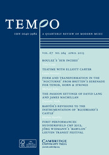
TEMPO
Advancing Musical Perspectives Since 1939TEMPO, a renowned journal published by Cambridge University Press, is dedicated to the expansive field of music studies. With its rich history dating back to 1939, the journal has significantly evolved, offering researchers, professionals, and students a platform to explore diverse musical perspectives and innovations. Serving as a vital resource in its category, TEMPO is currently positioned in the Q2 quartile within the field of Music, reflecting its quality and academic influence. Although it operates under a traditional subscription model, its impactful contributions to music scholarship are underscored by its active engagement with contemporary issues in musicology, performance, and education. Researchers can rely on TEMPO for cutting-edge analyses, reviews, and critical discourse that shape the understanding of music in society.
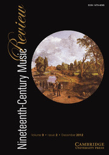
Nineteenth-Century Music Review
Fostering Critical Discourse on Historical MelodiesNineteenth-Century Music Review, published by CAMBRIDGE UNIVERSITY PRESS, is an essential scholarly journal in the field of musicology, particularly focusing on the vibrant and transformative period of the nineteenth century. This journal, archived under ISSN 1479-4098 and E-ISSN 2044-8414, serves as an invaluable platform for researchers, professionals, and students alike who are dedicated to exploring the multifaceted interactions between music and society during a time of significant cultural change. With its commitment to high-quality research and critical discourse, it embraces a diverse range of topics, including historical analysis, performance practice, and socio-cultural contexts within music. Operating from the United Kingdom, Nineteenth-Century Music Review is currently categorized in the fourth quartile of music journals according to Scopus rankings, offering a unique opportunity for emerging scholars to contribute to the expanding dialogue in this niche while also reaching a broad audience within the arts and humanities. Although the journal follows a traditional subscription-based model, it continues to be a pivotal resource for academic inquiry and knowledge dissemination in the landscape of nineteenth-century music history.
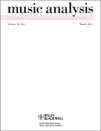
MUSIC ANALYSIS
Advancing the Art of Music ScholarshipMUSIC ANALYSIS, published by WILEY, is a prestigious journal in the field of musicology, recognized for its critical contributions to the analysis of music and its myriad influences on culture and society. With an ISSN of 0262-5245 and an E-ISSN of 1468-2249, this journal has established itself as a vital resource for researchers, professionals, and students alike, boasting a Q1 ranking in the 2023 category of Music. As part of a highly competitive field, it ranks 70th out of 180 in the Arts and Humanities Music category on Scopus, positioning it within the 61st percentile. MUSIC ANALYSIS serves as an essential platform for innovative research and insightful discourse, engaging with musical theory, practice, and education from 1996 to 2024. Its commitment to fostering rigorous scholarship makes it indispensable for those seeking to deepen their understanding of music and its analytical frameworks. Although it does not offer Open Access options, its relevance and impact in the genre ensure accessibility through institutional subscriptions and university libraries.

Studia Universitatis Babes-Bolyai Musica
Elevating Music Studies with Rigorous ResearchStudia Universitatis Babes-Bolyai Musica is a prestigious academic journal dedicated to the field of musicology, published by UNIV BABES-BOLYAI. Since its inception, it has strived to foster scholarly communication and share groundbreaking research that spans various music-related disciplines, including ethnomusicology, music theory, and performance studies. The journal operates under an Open Access model since 2021, ensuring that its content is freely accessible to a global audience of researchers, professionals, and students interested in advancing their knowledge and understanding of music. By providing a platform for high-quality, peer-reviewed articles, Studia Universitatis Babes-Bolyai Musica plays a vital role in promoting significant contributions to the evolving discourse in music studies. Its commitment to intellectual rigor and openness aligns with contemporary academic trends, making it an essential resource in the realm of music research.